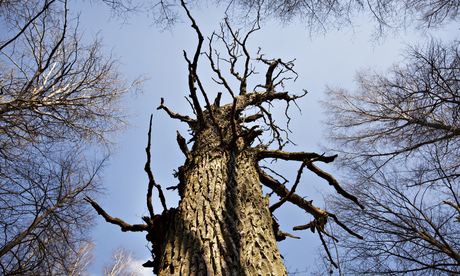Giles Fraser in The Guardian
Theresa May won’t be around in the early 22nd century when, according to Star Trek at least, Dr Emory Erickson will have invented the transporter – a device that will be able to dematerialise a person into an energy pattern, beam them to another place or planet, and then rematerialise them back again. In such a world people will be able to move as quickly and freely as an email.
The philosopher Derek Parfit has rightly questioned whether such a thing is even philosophically possible: will the rematerialised person be the same person as the dematerialised one, or just a perfect copy. (What would happen if two copies of me were rematerialised? Would they both be me?) Parfit thus raises a fascinating philosophical question about what we mean by personal identity – or what makes me me.
But, just for the sake of argument, imagine what such a device would do to Mrs May’s keep-them-all-out immigration policy. With the transporter, there could be no border controls and no restrictions on the free movement of individuals. Economic migrants would love it. People will be able to live and work where they like, beaming instantly from Syria to Sussex or indeed to Saturn. And because of this, the whole concept of the nation state will eventually wither away. People will have become more powerful than the state.
Fanciful? Of course. Forget about the technical problems. The fundamental problem is that human beings are not fungible. A copy is not the same as its original. A person cannot be dematerialised into a series of digital zeros and ones, get beamed over space and be rematerialised as the same person.
But – and here is the really big thing – money can be. For the whole point about money is that it is fungible. It can be converted into zeros and ones and it can be digitally shot across space. And since the late 1970s, when capital controls were relaxed all around the world, and then even more so since the digital revolution, money has been able to go where it pleases, unimpeded, without any need for a passport or reference to border control. Every day, trillions of dollars are economic migrants, crossing boundaries as if they didn’t exist, pouring in and out of countries looking for the most economically advantageous place to be. And, just as with the fanciful people-transporter example, this free movement of capital is how the nation state is dissolving.
This week the OECD published a report on international companies and tax avoidance. Big companies like AstraZeneca are able to pay next to no tax in the UK because they just transport their profits to a low-tax regime in another country. Indeed, some countries, pathetically prostrating themselves before the gods of finance, exist for little other than this purpose. And so the situation we find ourselves in is that money is free to travel as it pleases but people are not. We have got used to this as the new normal, and it largely goes unremarked. Yes, there are a few on the libertarian fringe who recognise this as a contradiction and argue that people should be as free as capital. But the majority on the right do everything they can to protect the free movement of capital and restrict the free movement of people.
Which is why the neoliberal right in Britain has utterly contradictory instincts over Europe – they want the free trade bit but they don’t want the free people bit. And they scare us with how the free movement of people threatens our national identity but refuse to face the fact that the free movement of capital can be seen as doing exactly the same. They talk a good game about the importance of freedom: but it’s one rule for capital and another for people.
Of course the transporter won’t happen. But with the internet, the imagination can travel where it will. And that means poor people will always see and want what rich people have. And not even Mrs May will be able to stop them crossing dangerous seas and borders to find it.
'People will forgive you for being wrong, but they will never forgive you for being right - especially if events prove you right while proving them wrong.' Thomas Sowell
Search This Blog
Showing posts with label fungible. Show all posts
Showing posts with label fungible. Show all posts
Thursday, 8 October 2015
Tuesday, 22 April 2014
Limits to markets - Can you put a price on the beauty of the natural world?
Those who reduce nature to a column of figures play to an agenda that ignores its inherent value – and seeks to destroy it

‘This is the way it’s going now. Everything will be fungible. Place, past, love and enchantment will have no meaning.' Photograph: David Levene
George Orwell warned that "the logical end of mechanical progress is to reduce the human being to something resembling a brain in a bottle". This is a story of how it happens.
On the outskirts of Sheffield there is a wood which, some 800 years ago, was used by the monks of Kirkstead Abbey to produce charcoal for smelting iron. For local people,Smithy Wood is freighted with stories. Among the trees you can imagine your way into another world. The application to plant a motorway service station in the middle of it, wiping out half the wood and fragmenting the rest, might have been unthinkable a few months ago. No longer.
When the environment secretary, Owen Paterson, first began talking about biodiversity offsetting – replacing habitats you trash with new ones created elsewhere – his officials made it clear that it would not apply to ancient woodland. But in January Paterson said he was prepared to drop this restriction as long as more trees were planted than destroyed.
His officials quickly explained that such a trade-off would be "highly unlikely" and was "very hypothetical". But the company that wants to build the service station wasn't slow to see the possibilities. It is offering to replace Smithy Wood with "60,000 trees ...planted on 16 hectares of local land close to the site". Who cares whether a tree is a hunched and fissured coppiced oak, worked by people for centuries, or a sapling planted beside a slip-road with a rabbit guard around it?
As Ronald Reagan remarked, when contemplating the destruction of California's giant redwoods, "a tree is a tree". Who, for that matter, would care if the old masters in the National Gallery were replaced by the prints being sold in its shop? In swapping our ancient places for generic clusters of chainstores and generic lines of saplings, the offsetters would also destroy our stories.
So we turn for relief to Natural England, the official body whose purpose is "to conserve and enhance the natural environment". Whoops. Its new chair, Andrew Sells, a major donor to the Conservative party, made his fortune in housebuilding, the industry most likely to benefit from biodiversity offsetting. Its deputy chair, David Hill, is also chair of Environment Bank, a private company set up "to broker biodiversity offsetting agreements for both developers and landowners". The success of Environment Bank is partly dependent on decisions taken by Natural England. How many people believe it is acceptable for Hill to hold both posts?
But this is the way it's going now: everything will be fungible, nothing will be valued for its own sake, place and past and love and enchantment will have no meaning. The natural world will be reduced to a column of figures.
That is the hope expressed in the latest report by the government's Natural Capital Committee, whose chair, Dieter Helm, claims that "the environment is part of the economy and needs to be properly integrated into it so that growth opportunities will not be missed". This, to me, is the wrong way round. The economy is part of the environment and needs to be steered so opportunities to protect our world of wonders will not be missed. Integrating the environment into the economy, Helm believes, is hampered by a lack of "proper accounting for natural assets", which is what his committee seeks to redress.
So come with me into the faery realm. The government's targets for protecting freshwater ecosystems, the committee claims, would deliver an aesthetic value of about £700m. The enhanced wildlife value of well-managed semi-natural grasslands is £40m. An appropriate disclaimer would be: these figures are rubbish, but we're printing them anyway.
I can understand the temptation. I can see how a financial case might be heeded by people who otherwise take no interest. But it's not just that the output is mostly gibberish. More important, like the offsetting of ancient woodland, it re-frames the urge to protect nature – an urge that springs from wonder and delight – as something completely different.
In his interview with the Guardian a few weeks ago, George Lakoff, the cognitive linguist who has done so much to explain why progressive parties keep losing elections they should win, explained that attempts to monetise nature are a classic example of people trying to do the right thing without understanding frames: the mental structures that shape the way we perceive the world.
As Lakoff points out, you cannot win an argument unless you expound your own values and re-frame the issue around them. If you adopt the language and values of your opponents "you lose because you are reinforcing their frame". Costing nature tells us that it possesses no inherent value; that it is worthy of protection only when it performs services for us; that it is replaceable. You demoralise and alienate those who love the natural world while reinforcing the values of those who don't.
To expect the committee's phoney figures to swing the argument is worse than naive in a world in which cost-benefit analyses are systematically rigged. For instance, the financial case for new roads in the United Kingdom, shaky at the best of times, falls apart if you attach almost any value to the rise in greenhouse gases they cause. Case closed? No: the government now insists, in its draft national policy statement, that climate change cannot be taken into account when deciding whether or not a road is built.
Do you believe that people prepared to cheat to this extent would stop a scheme because one of the government's committees has attached a voodoo value to a piece of woodland? It's more likely that the accounting exercise would be used as a weapon by the developers. The woods are worth £x, but by pure chance the road turns out to be worth £x +1. Beauty, tranquillity, history, place, particularity? Sorry, they've already been costed and incorporated into x – end of discussion. The strongest arguments that opponents can deploy – arguments based on values – cannot be heard.
This is why the government set up the Natural Capital Committee. This is why it promotes biodiversity offsets, even for ancient woodland. It is re-framing the issue. Those who believe they can protect nature by adopting this frame are stepping into a trap their opponents have set.
Subscribe to:
Comments (Atom)
